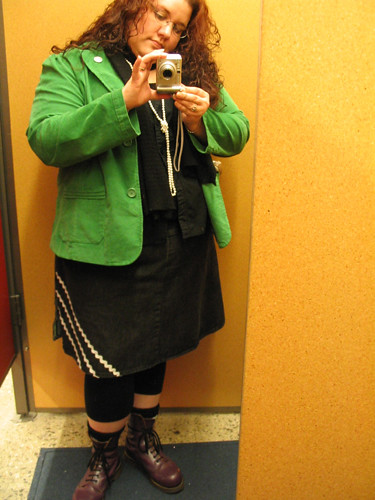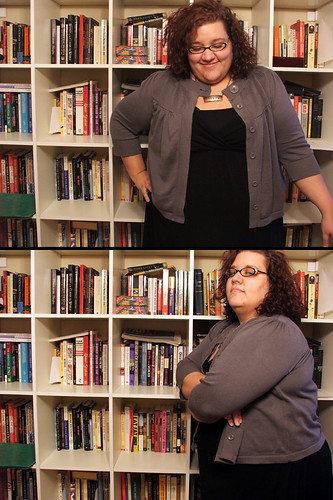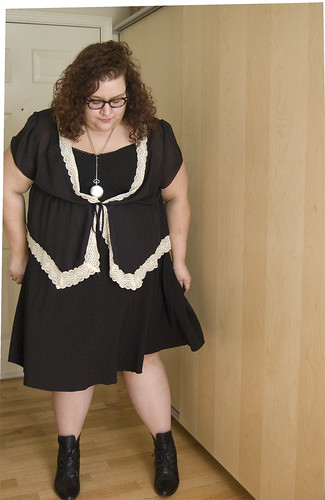Happy Size-iversary.
By Lesley | September 23, 2009

On the recent piece about size acceptance on Good Morning America (I originally wrote about it here), there was a tiny soundbite from a doctor, wearing a white coat and standing in what looks like an examination room, saying that she believes size acceptance, as a movement, is really just an excuse for gaining weight.
And it may be. Like any philosophical position or perspective, size acceptance means different things to different people, and therefore has the potential to serve a multiplicity of different purposes. I’ve no doubt there are large numbers of folks who come to size acceptance because they’ve gained weight and they’re tired of flagellating themselves about it. I don’t actually think there’s anything wrong with that; people’s relationships with their bodies are private, and so they should be. Therefore, if someone comes to a body-positive way of thinking for that reason, I’m hardly one to tell them they’re doing it wrong. More to the point, calling fat acceptance an “excuse” for gaining weight suggests that there is never an “excuse” for gaining weight, which further suggests that gaining weight is always inexcusable under any circumstances and you clearly have no self-control you foul butter-eating fatass. The unspoken subtext here is that it’s never okay to gain weight and so people who do should feel badly about themselves and it’s irresponsible to tell them they might accept their bodies as they are.
It is a pretty universal and unavoidable truth that bodies change over time. We get older, our mobility shifts one way or the other, we have ailments that come and go (or stay forever), some of us have children, some of us change medications, with the result that most of us, eventually, get a little fatter and a little thinner by turns, depending on circumstance. The “thinnest” stretch of my adult life thus far–thinnest in scare quotes because even at my thinnest I was wearing a size 18/20–took place between 1997 and 1998, as a result of overwork, overstress, and significant depression. I have had to train family members not to ooh and ahh over the few pictures of me that exist from back then, because while I was markedly thinner, my face is drawn and pale, and my eyes are empty. I am incapable of looking at those pictures without feeling my heart break for the sad young woman I was; all I can think is that I want to take her to lunch and gently pat her shaking hand and tell her she’ll be fine in a few years. So it’s hardly a surprise that my “thinnest” period is not something I look back on with wistful memories.

On the other hand, my fattest period is the happier, saner, work/life-balanced one I’ve been on for ten years now.
It’s unfathomable, given the cultural expectations on the subject, that a fat person is anything but constantly-expanding, like an inflating balloon. If fat is an unnatural state, then needs must that its maintenance be accomplished through unbridled voracious eating and a strong commitment to being as inactive as possible. I don’t purport to represent all fat people everywhere; there are fat people gaining weight and I am not disputing that. Nor am I dismissing those people as unworthy of size acceptance. I can only speak for myself, and I have neither gained nor lost any measurable amount of weight in a long, long time. To be exact, I’ve just realized recently that as of 2009, my size hasn’t noticeably budged in a decade.
I know precisely when it changed last: in early 1999 I moved in with my then-boyfriend, now-husband, to an apartment in a smaller city just north of Boston. Prior to this, as an undergraduate student, I’d lived in Boston proper for four years, a good fifteen-minute walk from the nearest public transit station though I only rarely took the train anywhere unless I was going across the river to Cambridge. At the time I was walking at least seven or eight miles on a typical day, just to get where I needed to go, from home to school to work and back again. The move to a more driving-focused area meant I walked far, far less; couple that with my also becoming a graduate student around the same time (which is arguably one of the most sedentary pursuits in the whole damn world) and over that year I gained something between fifteen and twenty pounds, and went up a clothing size. By late 1999 my weight had stabilized again, and since then my size has been remarkably predictable; in truth, I still have (and still wear–those that aren’t hopelessly outdated, anyway) a few dresses I bought around that time.
It’s actually a bit of a marvel, even to me, and makes as strong a case for set point theory as I can personally imagine. Over the past ten years I’ve been a strict vegetarian, and I’ve been an omnivore; I’ve been robustly healthy and I’ve also been sick to the extent of needing abdominal surgery; I’ve worked out religiously five days a week for years, and I’ve also been terrifically sedentary for equally-long stretches of time. And despite all these changes my size and my weight has held steady; I’ve neither gained nor lost anything of significance. The stretch marks on my belly, which I developed first during weight gain in high school, and again during my last weight gain in 1999, have faded to near-invisibility. My body has changed, insofar as my late 20s saw my fat shifting a bit, and I have more of a squash shape now whereas I used to be more of an apple. Nevertheless, my body and its heft, the occasional fat-shifting upheaval notwithstanding, are wonderfully familiar and natural and predictable to me, and I suspect it’s because I have learned to trust that my body knows what it’s doing, and I’m pretty astute at telling when something is wrong.

It’s an affront to almost all of the conventional wisdom on size and weight, I know, but it could just be possible that–if not as a result of the damage to my metabolism from strict and continuous dieting during my more formative years, then maybe a result of heredity, or just plain dumb luck–this is my size. The medical community as well as cultural expectations would have me believe that fatness on my scale, the lofty heights of the 300+ pounders, is unnatural and impossible to maintain without an extreme regimen of donut-scarfing and, when full, rubbing myself with lard so that I might absorb more fat through my very pores.
But so far as I’m concerned, the medical community and cultural expectations can go fuck themselves. They don’t live in here, with me, and a million research studies on the bodies of a million fat people still won’t ever tell my unique story. Because–and I should make this the tagline at the top of this blog because I say it so much–all bodies are different. I may get no fatter but that does not mean that someone who does shouldn’t be encouraged to realize and accept their normal weight and to come to a place where their body isn’t a rebellious monster to be mastered but is, instead, the treasured and cared-for vehicle through which they experience the world. Fat people are not a pathology and they are not a monolith. They’re different. Just like thin people.
Comments are closed.





 Two Whole Cakes is a blog written by
Two Whole Cakes is a blog written by 

